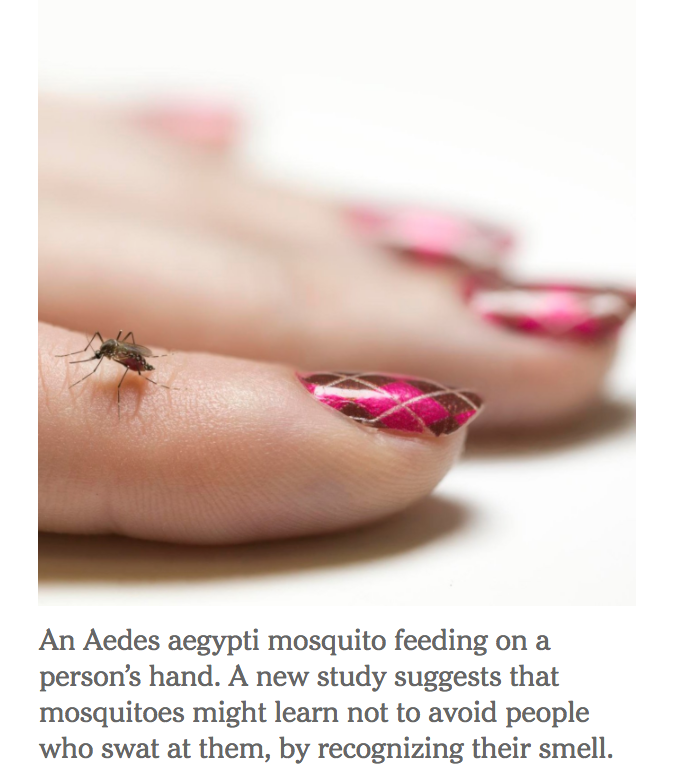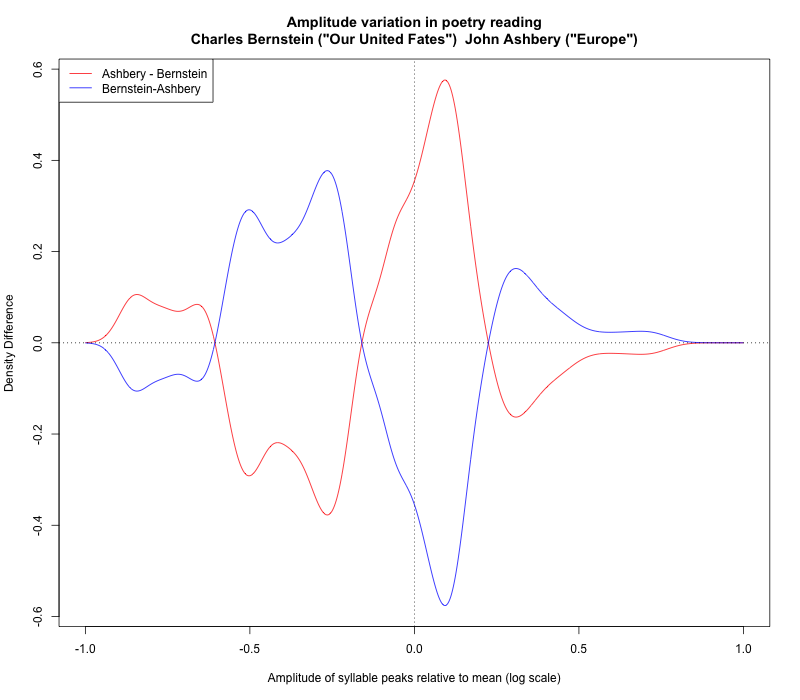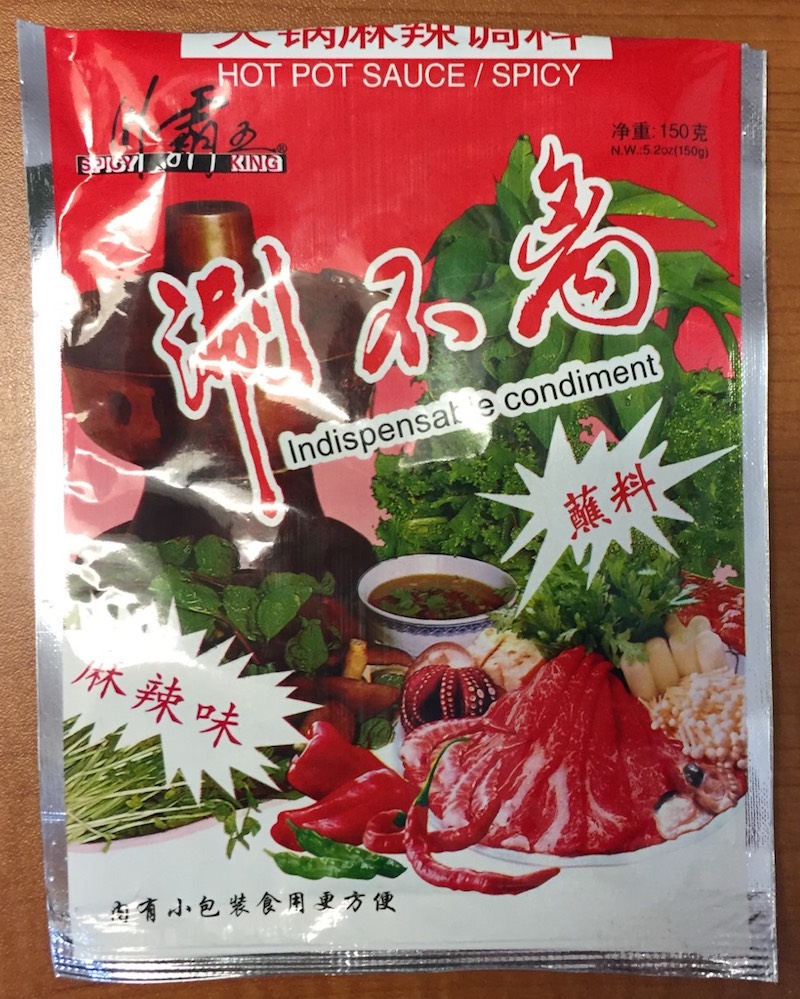Learning not to avoid
 Joanna Klein, "Swatting at Mosquitoes May Help You Avoid Bites, Even if you Miss", NYT 1/25/2018:
Joanna Klein, "Swatting at Mosquitoes May Help You Avoid Bites, Even if you Miss", NYT 1/25/2018:
If you keep swatting at a mosquito, will it leave you alone?
Some scientists think so. But it depends.
Some blood meals are worth a mosquito risking its life. But if there’s a more attractive or accepting alternative to feed from, a mosquito may move on to that someone or something instead.
An interesting story. But this is Language Log, not Insect Learning Log, so let's focus on the prominently-displayed picture caption, which reads:
A new study suggests that mosquitoes might learn not to avoid people who swat at them, by recognizing their smell.
Read the rest of this entry »
Poetic dynamism
Well, the dynamic range of the amplitude of syllables in poetry readings, anyhow:
What IS that?
Read the rest of this entry »
Language vigilantism
In "The Eagle-Eyed Vigilantes Defending the Chinese Language: As new lingo springs up and grammatical errors persist, one magazine is battling to maintain linguistic standards", Yin Yijun (Sixth Tone [1/19/18]) describes an unusual PRC journal:
Shanghai-based Yaowen Jiaozi — whose name literally translates as “biting phrases and chewing characters” — was established in 1995 and operates under the slogan: “Bite every mistake that deserves to be bitten, and chew every article worth chewing.” The monthly magazine’s mission is to attack every grammatical error it encounters — and the staff take the job seriously. Over the past 20 years, the magazine has amassed a long list of mistakes, from a nearly unnoticeable Chinese character error on a chopstick wrapper, to a series of mistakes author and Nobel laureate Mo Yan made in his award-winning works.
Read the rest of this entry »
Putin in Russian, Mandarin, and English
I'm at Yale University attending a workshop on Tangut. So you ask, "What is 'Tangut'?" Relevant Wikipedia articles:
- Tangut people, an ancient ethnic group in Northwest China, not Tibetan people.
- Tangut language, the extinct language spoken by the Tangut people, not Tibetan language.
- Tangut script, the writing system used to write the Tangut language
- Western Xia (1038–1227), also known as the Tangut Empire, a state founded by the Tangut people
Enough of Tangut for now. I will write a separate post on Tangut language and script later on. Meanwhile, since the majority of specialists on Tangut are Russian, and several Russians are participating in this workshop, I've heard them refer to the president of their country with a pronunciation that is rather different from what we say it in English, but more nearly resembles the way his surname is spoken in Mandarin.
Read the rest of this entry »
Decreasing definiteness in crime novels
In a series of posts over the last few years, I've documented gradual declines in the frequency of the English definite determiner "the" in a wide variety of text sources: State of the Union addresses, Medline abstracts, the Corpus of Historical American English, Google Books (from both American and British sources), and so on. Both in conversational speech and in informal writing, we see the kind of correlation with sex and age that we expect for a language change in progress; and there are surprisingly systematic geographical differences. (See the links below for details.)
For reasons discussed in a couple of recent posts ("Proportion of dialogue in novels", 12/29/2017; "Ross Macdonald: lexical diversity over the lifespan", 1/13/2018), Yves Schabes and I have been analyzing variation over time in the writing of some prolific 20th-century authors, so this morning I thought I'd take the opportunity to look at longitudinal changes in "the" usage in the two authors whose books I've processed so far, Agatha Christie and Ross Macdonald.
Read the rest of this entry »
Using Chinese nonstandard characters to talk cute
Here are some examples of such substitutions:
Further evidence of mixed script writing in Chinese
Michael Cannings relayed this tweet by Dave Flynn:
When did replacing 很 with "hen" become a thing in Taiwan? pic.twitter.com/IHX8b5EWLZ
— Dave Flynn (@DaveFlynn) January 18, 2018
Read the rest of this entry »
Questionable Sino-Mongolian toponymy
News article from Xinhua (1/16/18, by Quan Xiaoshu, Qu Ting, Cao Pengyuan):
"Ancient tripartite-city of Xiongnu a special religious and meeting site: archaeologists"
It starts:
Bathrobe comments:
Now, it may be due to my poor web research skills, but I'm having considerable difficulty finding any Sanlian city or even a Khermental city in Mongolia outside of the Xinhua news article.
Read the rest of this entry »
Doubletalk challenge
Malia Wollan, "How to Speak Gibberish", NYT Magazine 1/5/2018:
Strive for linguistic plausibility. In 2014, Sara Maria Forsberg was a recent high-school graduate in Finland when she posted “What Languages Sound Like to Foreigners,” a video of herself speaking gibberish versions of 15 languages and dialects. Incorporate actual phonology to make a realistic-sounding gibberish. “Expose yourself to lots of different languages,” says Forsberg, now 23, who grew up speaking Finnish, Swedish and English.
Read the rest of this entry »
Apostrophosis
According to Andrew Higgins ("Kazakhstan Cheers New Alphabet, Except for All Those Apostrophes", NYT 1/15/2018), the pending turn to a Latin alphabet for Kazakh has run into a pothole: the 77-year-old dictator Nursultan A. Nazarbayev, who apparently has not yet been informed about Unicode, or the possibility of varied computer keyboard layouts.
Mr. Higgins also seems to be in the dark about such arcana — he refers to characters (or maybe diacritics) as "markers", for some reason, and apparently thinks that the Latin alphabet is nothing but good old US ASCII, with none of those furrin umlauts and accents and cedillas and such:
Because Kazakh features many sounds that are not easily rendered into either the Cyrillic or Latin alphabets without additional markers, a decision needed to be made whether to follow Turkish, which uses the Latin script but includes cedillas, tildes, breves, dots and other markers to clarify pronunciation, or invent alternative phonetic pointers.
Read the rest of this entry »


